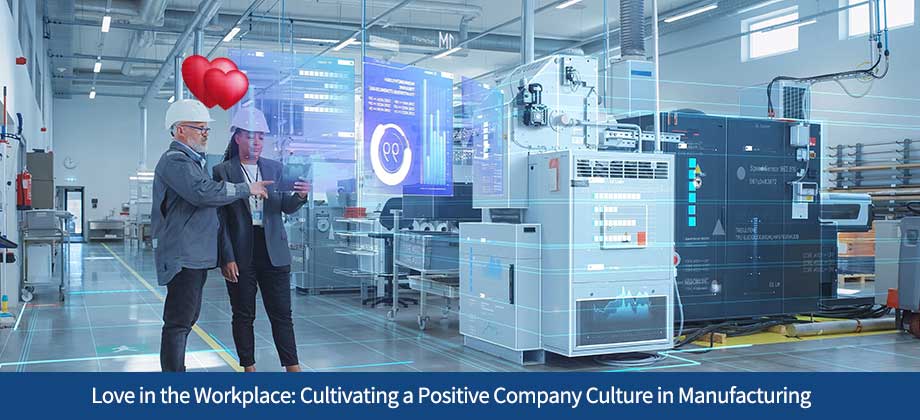Love in the Workplace: Cultivating a Positive Company Culture in Manufacturing

In the often-rigorous world of manufacturing, the idea of ‘love’ can seem at odds with the traditional image of a factory floor or the cutthroat world of supply chain management. Yet, companies are quickly realizing the transformative power of fostering a positive, affectionate work environment, and the manufacturing sector is no exception. By focusing on creating a culture that truly values and supports its workforce, manufacturers have an opportunity to boost their retention rates, productivity, and overall success. In this comprehensive guide, we’ll explore how to infuse your manufacturing environment with the kind of workplace ‘love’ that drives success.
Understanding Love in the Workplace
The term ‘love’ often conjures images of romance or personal relationships, but it has a place in the professional world, too. In this context, love refers to the deep connection employees feel toward their work, their peers, and their company. It includes a sense of belonging, a desire to collaborate, and an understanding that the work being done has value, both personally and in the broader sense. The benefits of cultivating this kind of work environment are numerous and can range from increased job satisfaction to higher levels of innovation.
Benefits of Fostering Love in the Workplace
- Enhanced Morale: Employees who feel valued and connected to their work environment are happier and more motivated.
- Improved Collaboration: Love in the workplace encourages employees to work together and support one another, improving team dynamics and problem-solving capabilities.
- Higher Retention: A positive culture that fosters ‘love’ can lead to lower turnover rates, saving companies time and resources.
- Boosted Productivity: When employees feel good about their work and their workplace, their drive to produce high-quality work increases.
Building a Positive Manufacturing Culture
Creating a culture of ‘love’ in the workplace requires a concerted effort from leadership down to the newest hires. It involves establishing and reinforcing values and practices that promote positivity, support, and growth.
Leadership Commitment and Buy-in
Leaders who demonstrate commitment to fostering a positive culture set the tone for the entire organization. This can involve leading by example, prioritizing employee well-being, and openly supporting programs and initiatives that contribute to a healthier work environment.
Employee Empowerment and Engagement
Empowered employees have a stake in the success of the company and are more likely to engage with their work on a deeper level. By involving employees in decision-making processes, giving them a voice, and listening to their feedback, companies can empower their workforce and promote a more inclusive culture.
Recognizing and Celebrating Achievements
Acknowledging the successes of individuals and teams is crucial to building a culture of positivity and appreciation. This can be as simple as a verbal ‘thank you’ in a team meeting, or as elaborate as an annual awards ceremony, depending on the size and structure of the company.
Creating a Supportive and Inclusive Environment
A workplace that is supportive and inclusive will naturally foster a sense of belonging and ‘love’. This involves implementing policies that prevent discrimination, supporting work-life balance, and offering resources for personal and professional development.
Retention Strategy in Manufacturing
Employee retention is a critical metric for any industry, but it is uniquely challenging in manufacturing, which often faces issues related to labor shortages and high turnover rates. A strong company culture can be a powerful tool in the battle for talent.
The Role of Company Culture in Employee Retention
Company culture is often cited as a key reason employees choose to stay at or leave a job. Retaining employees involves creating an environment in which they feel connected, appreciated, and supported in their professional goals.
Challenges Specific to the Manufacturing Industry
Manufacturers must address unique challenges in retaining skilled workers, such as the physical demands of the job, the need for ongoing safety training, and the operational complexities of the production environment.
Strategies for Cultivating Love in the Workplace
- Wellness Programs: Implementing wellness initiatives like on-site fitness programs or ergonomic equipment can demonstrate a commitment to employee health and well-being.
- Continuous Learning: Providing ongoing training and development opportunities shows employees that the company is invested in their growth.
- Mentorship Programs: Pairing newer employees with seasoned professionals can help bridge knowledge gaps and foster a sense of community.
Case Studies and Examples
Looking at successful examples of companies that have prioritized their cultures can provide insight and inspiration for others looking to create a more loving workplace.
Success Stories of Manufacturing Companies with Positive Cultures
- A leading metal fabrication company saw a decrease in turnover and a simultaneous increase in productivity after implementing a new cultural initiative focused on respect and collaboration.
- An automotive parts manufacturer, faced with a competitive labor market, revamped its employee wellness program and saw a significant drop in absenteeism and turnover.
The notion of ‘love’ in the workplace may seem out of place in the realm of manufacturing, but it is an essential element for companies that aspire to be leaders in their industry. A positive and supportive company culture can serve as a critical retention strategy and a catalyst for organizational success. By investing in the well-being and satisfaction of their employees, manufacturers can create an environment where ‘love’ is not only felt but actively contributes to the bottom line.
Manufacturers must commit to evaluating and enhancing their company cultures, ensuring that they prioritize the human aspect alongside their operational and production goals. As we move into an era where the employer-employee relationship evolves, those companies at the forefront of positive culture building will be the ones who attract and keep the best talent, driving their success for years to come.
Your privacy is important to us. ARF Financial will never sell or rent your information to any third party. Click here for more information about our privacy policy.

